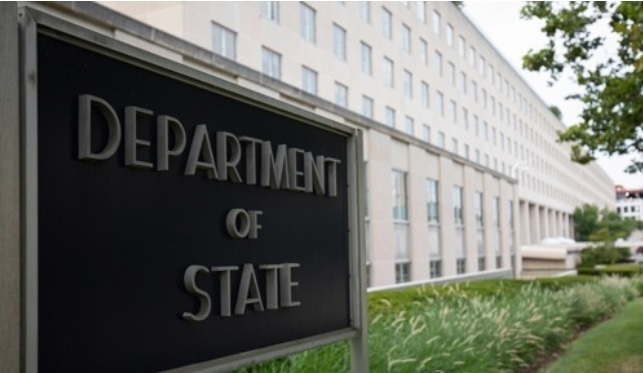State Department says Japan's wartime sexual slavery an egregious violation of human rights
By YonhapPublished : Feb. 19, 2021 - 09:18

The US State Department said on Thursday that Japan's trafficking of women for sexual services during World War II was a serious violation of human rights, flatly contradicting a controversial claim by a Harvard professor that such women were rather voluntary prostitutes.
"As the United States has stated many times, the trafficking of women for sexual purposes by the Japanese military during World War II was an egregious violation of human rights," a department spokesperson told Yonhap News Agency, speaking on condition of anonymity.
The remarks come amid a public uproar sparked by J. Mark Ramseyer, Mitsubishi professor of Japanese Legal Studies at Harvard Law School, who argued that former sex slaves for the Japanese military were prostitutes who had entered into voluntary contracts.
His claim has also prompted serious concerns among many in the US who believe it may be one of Japan's latest attempts to whitewash its war atrocities.
The department official said the US is monitoring the situation.
"We continue to closely follow developments in relations between our two close allies, Japan and the Republic of Korea (ROK)," the official said, referring to South Korea by its official name.
"We have long encouraged Japan and the ROK to continue to work together on this issue in a way that promotes healing and reconciliation," added the official.
The official also highlighted the importance of the countries working together to promote democratic values, including human rights.
"The United States values our robust and productive trilateral relationship with Japan and the Republic of Korea as we work together to promote our shared commitment to freedom, human rights, democracy, women's empowerment, and the rule of law in the Indo-Pacific region and across the globe." (Yonhap)
"As the United States has stated many times, the trafficking of women for sexual purposes by the Japanese military during World War II was an egregious violation of human rights," a department spokesperson told Yonhap News Agency, speaking on condition of anonymity.
The remarks come amid a public uproar sparked by J. Mark Ramseyer, Mitsubishi professor of Japanese Legal Studies at Harvard Law School, who argued that former sex slaves for the Japanese military were prostitutes who had entered into voluntary contracts.
His claim has also prompted serious concerns among many in the US who believe it may be one of Japan's latest attempts to whitewash its war atrocities.
The department official said the US is monitoring the situation.
"We continue to closely follow developments in relations between our two close allies, Japan and the Republic of Korea (ROK)," the official said, referring to South Korea by its official name.
"We have long encouraged Japan and the ROK to continue to work together on this issue in a way that promotes healing and reconciliation," added the official.
The official also highlighted the importance of the countries working together to promote democratic values, including human rights.
"The United States values our robust and productive trilateral relationship with Japan and the Republic of Korea as we work together to promote our shared commitment to freedom, human rights, democracy, women's empowerment, and the rule of law in the Indo-Pacific region and across the globe." (Yonhap)






![[From the Scene] Monks, Buddhists hail return of remains of Buddhas](http://res.heraldm.com/phpwas/restmb_idxmake.php?idx=644&simg=/content/image/2024/04/19/20240419050617_0.jpg&u=20240419175937)









![[From the Scene] Monks, Buddhists hail return of remains of Buddhas](http://res.heraldm.com/phpwas/restmb_idxmake.php?idx=652&simg=/content/image/2024/04/19/20240419050617_0.jpg&u=20240419175937)

![[KH Explains] Hyundai's full hybrid edge to pay off amid slow transition to pure EVs](http://res.heraldm.com/phpwas/restmb_idxmake.php?idx=652&simg=/content/image/2024/04/18/20240418050645_0.jpg&u=20240419100350)

![[Today’s K-pop] Illit drops debut single remix](http://res.heraldm.com/phpwas/restmb_idxmake.php?idx=642&simg=/content/image/2024/04/19/20240419050612_0.jpg&u=)